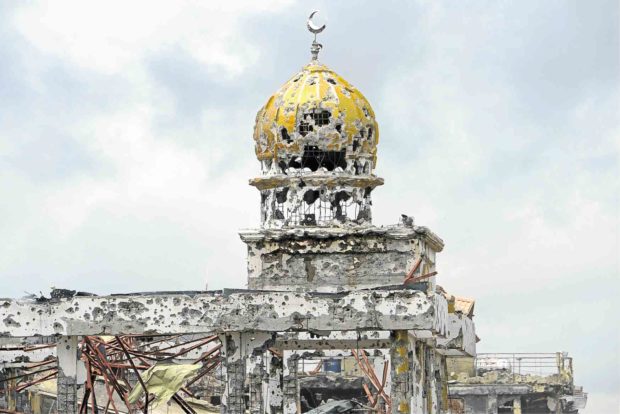Task force to review aid pledges for Marawi rehab

WAR-DAMAGED A bombed-out mosque stands in what was once the scene of intense fighting between government troops and Islamic State supporters in Marawi City. AFP
The government task force in charge of rebuilding Marawi would evaluate aid pledges from foreign donors for the rehabilitation of the war-torn city following Manila’s policy to reject aid with conditions that supposedly violate Philippine sovereignty.
Task Force Bangon Marawi spokesperson Kristoffer James Purisima said the Philippines had received pledges from the European Union, US Agency for International Development, Asian Development Bank, World Bank, UN Development Program, Australia and Japan.
“We’re studying this within the framework of the task force … because that’s the agreement among the agencies of the task force—that any pledge or any aid that we receive or if there are offers of donations, these would pass through the task force,” Purisima told reporters in Malacañang.
Government agencies that receive offers of assistance from organizations or countries would have to inform the task force, which would decide whether to accept them, he said.
The decision would consider the kind of aid and the need for it, he said, adding that the President’s new policy pronouncements would be a factor.
Article continues after this advertisement“Of course we’re duty-bound to follow those policies,” he said.
Article continues after this advertisementPresident Duterte earlier said the country would not accept grants from the European Union anymore because it disrespected Philippine sovereignty.
Foreign Affairs Secretary Alan Peter Cayetano said the country would not accept any foreign assistance that came with conditions that allowed donors to meddle in the country’s internal affairs.
The Philippines has also received assistance for Marawi from Canada, China, Germany, Korea, India, Thailand, Singapore and the Coordinating Centre for Humanitarian Assistance of the Association of Southeast Asian Nations, Purisima said.
Vice President Leni Robredo also urged private companies and civic groups to work with Bangon Marawi.
She explained that coordinating with the task force would be “the most effective way of helping people in Marawi because there is one plan for all.”
“That way, there is no duplication of efforts, [and] there is [fair] division of resources,” Robredo told reporters in the City of San Fernando in Pampanga where she spoke at the 30th anniversary of Talete King Panyulung Kapampangan, a microfinancing nonprofit ecumenical group founded by Catholic priest Eddie Panlilio in 1986.
Robredo said she was unable to provide inputs for Marawi’s rehabilitation because she was not invited to the Legislative Executive Development Advisory Council and had not discussed Bangon Marawi with the President. —WITH REPORTS FROM TONETTE OREJAS